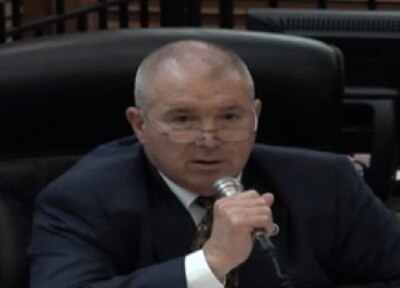On Wednesday, Rep. John Forgety announced he was foregoing a bill to replace the Common Core State Standards in Tennessee, in part because of a predicted $4 million price tag for the state.
In reality, a repeal of the standards could cost much more.
Of the 48 states that originally adopted Common Core – which sets academic benchmarks for each grade level – Tennessee is not the first to entertain the idea of scrapping them. Indiana and Oklahoma have begun the process of implementing their own standards, and Common Core hangs in the balance in legislatures in 16 other states. But new standards — even when they closely resemble the Common Core — can come with a hefty price tag.
Besides Forgety’s, at least three other Tennessee bills ask for repeal of the Common Core. However, none of the other three bills have been scheduled for debate yet, or have been assigned a fiscal note, which estimates how much the new legislation would cost the state.
The cost to write new standards is actually fairly modest, experts say. It’s everything else that goes with it – professional development, textbooks and classroom materials – that gets expensive.
“The implementation of new standards is quite complex,” said Kelly Henderson, who oversees K-12 curriculum for Metropolitan Nashville Public Schools. “It actually starts a year, or actually two years, before the actual implementation [of the standards].”

The fiscal note for Forgety’s bill, which would create “Volunteer State Standards,” estimates that the state would spend almost $4.2 million on new standards over the next four years. The note takes into account that the State Board of Education would hire new personnel to create the standards, as well as provide professional development to orient educators to the new standards. It allots $200,000 to update of TNReady, the Common Core-aligned test that is under development and already is costing the state about $108 million. The fiscal note does not mention the cost that local districts would incur, such as textbooks and more professional development for educators.
Despite uncertainty over Tennessee’s standards, Nashville and most other school districts across the state are buying new math textbooks aligned with the Common Core. Henderson said some districts have decided not to make that hefty investment, however, because of concern that the state could change the standards shortly afterward.
Typically, Tennessee districts buy textbooks for each subject every six years, when the State Board of Education approves new lists. Few, if any districts, have funding to update them more frequently.
Although standards are separate from curriculum, teachers say it helps when materials are aligned with the standards they teach. New standards likely would be paired with a need for new textbooks.
“There are contracts in place on the state and local level for assessments and materials that districts had planned to use to meet the Common Core Standards, and some of that cost could be wasted,” said Michael Brickman, national policy director for the Fordham Institute.
For example, Nashville’s district spent more than $8.6 million in 2011-2012, the last time it bought new math textbooks.
According to a recent audit of the Tennessee Department of Education, more than $17 million was spent to roll out the Common Core during the 2012-2013 and 2013-2014 school years. Much of that has been funded by federal money through the Race to the Top initiative.
Patrick Murphy, research director of the Public Policy Institute of California, studied the state costs of transitioning to the Common Core in 2012 for the Fordham Institute, a right-leaning think tank that has advocated for the Common Core. He said Tennessee’s centralized approach — having trainings and new course materials come from the state Department of Education, rather than having districts come up with their own — was cost-effective. The data suggests the state could make a cost-effective change again — especially if new standards aren’t radically different and teachers don’t have to be completely re-trained. But, he said, “if [Tennessee] decides to switch again, … you’d be walking away from the investment you made from this point. ”
Other states already are feeling the standards-switch pinch. Researchers at the Fordham Institute and the Oklahoma Business & Education Coalition predict the price for Oklahoma’s new standards could top $125 million because of the costs of new textbooks, professional development and a new assessment. Meanwhile, the Oklahoma Department of Education estimates the state’s move away from Common Core would cost the state only $1.24 million.
The nonpartisan Legislative Services Agency predicts that the price of preparing teachers for new standards in Indiana could top $125 million. The Louisiana Department of Education predicts a cost of $25 million for overhauling the standards in that state.
That’s why many teachers and administrators across Tennessee hope that future changes to the state standards are slow and subtle.

In February, 114 superintendents and school system directors across Tennessee signed a letter urging lawmakers to hold tight on the standards this session, in part because of the investment already made by districts and teachers for the transition to Common Core.
“Teachers have worked for years learning through the professional learning opportunities through the state and districts, countless hours, and funds,” said Lyle Ailshie, superintendent of Kingsport City Schools, during a news conference organized by the Tennessee Organization of School Superintendents (TOSS). “They’ve created curriculums that will go along with these standards that will be challenging and engaging for our students.”
More than money, teachers are concerned about the time they’ve invested in professional development around the Common Core and building new lesson plans, said Landon Melton, a math teacher at Cookeville High School in Putnam County.
“If they’ll just leave it alone and let us do our jobs, and quit changing their minds every two years, we’ll be fine,” he said. “It takes a long time to see the change.”
Contact Grace Tatter at gtatter@chalkbeat.org.
Follow us on Twitter: @GraceTatter, @chalkbeattn.
Like us on Facebook.
Sign up for our newsletter for regular updates on Tennessee education news.

